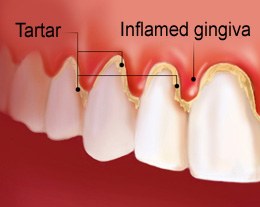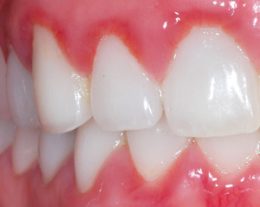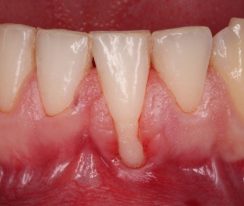Gum Disease Treatment
Gum disease can be prevented by regular checkups and professional teeth cleaning procedures.
How to Identify Gum Disease
- Gums are swollen, red and painful
- Bleeding while brushing or while having food
- Bad breath and bad taste in mouth
- Gums that have receded or moved away from its normal position on the tooth
- Teeth sensitivity
- Discharge of pus from the gums
- Teeth have become loose
- Appearance of spaces between teeth
- Dull pain in the bone beneath the gums which may get aggravated sometimes


Treatment of Gum Diseases
Treatment depends on the severity of the gum disease:
Teeth scaling:
Deposits called plaque and calculus get deposited on the teeth over a period of time. These deposits are crystalline in form and have a high content of bacteria. These deposits may extend from the outer surface of the teeth to the bone beneath the gums. It cannot be removed by brushing.
Regular professional teeth scaling done every 6 months removes these deposits and helps prevent bad breath and maintain healthy gums. Deep scaling will be required in extensive cases which may be done under local anesthesia.
Root Planing:
When the deposits extend beneath the gums and onto the tooth root, the gums may be reflected to expose the root surface. The root surface of the tooth is then cleaned using special instruments. The gums are then sutured back into position.
Curettage:
Disease of gums may lead to necrosis of the gum and attachment fibers between the teeth, gum and bone. These necrotized tissues are removed surgically by reflecting the gums. Instruments known as curettes are used for this purpose. Curettage stops bone loss and helps the gums to adapt firmly back to the tooth and bone.
Lasers may also be used to perform curettage. There is almost no bleeding and minimal postoperative pain with laser treatment.
Flap surgeries:
When there is bone loss and the gums move done along the length of the root, it is called gingival recession. This causes not only cosmetic issues but also loose teeth.
In flap surgeries, the flats of gums are reflected to expose the diseased surface, cleaned and the flaps are re-positioned in such a way so as to cover the exposed parts of the tooth root.
Flap surgeries may also involve procedures where bone and other tissue grafts are used to cover areas of recession.
Fibroma removal:
Certain medical conditions may lead to the formations of unsightly lumps called fibromas. These fibromas are usually benign. But it is recommended that it be removed after biopsy and histopathological analysis.
Pericoronitis treatment:
When the third molar is impacted below the level of the adjacent tooth, food gets lodged in the pocket of the tissue covering the third molar. This results in the tissue becoming inflamed and painful. The usual treatment requires the impacted third molar to be removed. But in cases where extraction is not possible, the tissue is surgically removed (operculectomy) to prevent further food lodgement in the gap. This is not a permanent treatment because the tissue usually grows back to its original form.

How to Prevent Gum Diseases
- Brushing your teeth twice a day is very important along with interdental flossing
- All surfaces of the teeth must be brushed including the inner,outer and chewing surfaces of the teeth
- Use mouthwashes that contain chlorhexidine to control the bacteria in your mouth
- Regular rinsing of mouth with warm salt water also helps reduce inflammation of gums
- Avoid sugary foods and treats which can elevate blood sugar levels especially in diabetic patients
 Aspen Dental Care
Aspen Dental Care